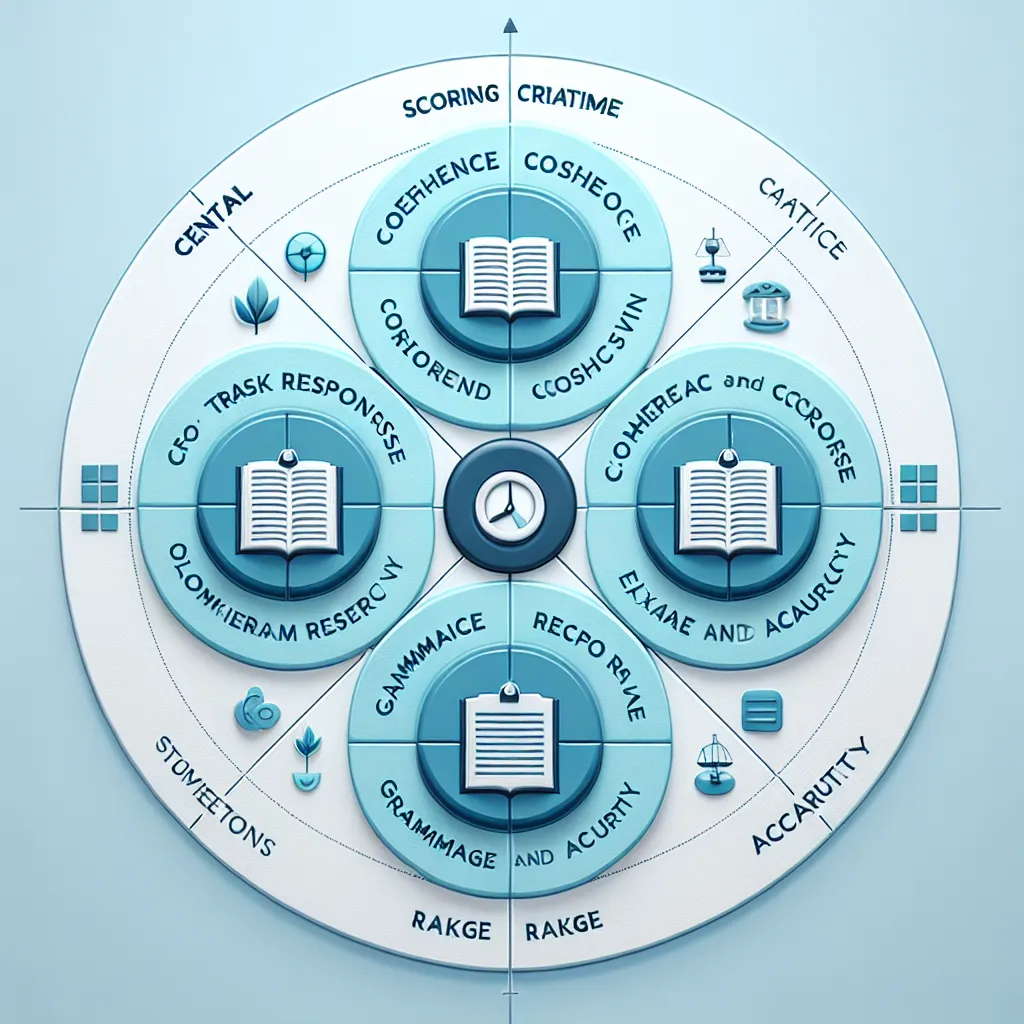Are you preparing for the IELTS exam and wondering how your Writing Task 2 will be evaluated? Understanding the scoring criteria is crucial for maximizing your performance in this important section of the test. In this comprehensive guide, we’ll break down the IELTS Writing Task 2 scoring system, providing you with valuable insights to help you achieve your desired band score.
Understanding the IELTS Writing Task 2 Scoring Criteria
IELTS Writing Task 2 is assessed based on four key criteria, each contributing equally to your overall band score. Let’s explore these criteria in detail:
1. Task Response
Task Response evaluates how well you’ve addressed all parts of the question and developed a position or argument.
Key aspects:
- Answering all parts of the question
- Providing relevant ideas and examples
- Developing a clear position throughout the essay
Tips for improvement:
- Carefully analyze the question and identify all parts that need addressing
- Plan your essay to ensure you cover all aspects of the task
- Use specific examples to support your arguments
2. Coherence and Cohesion
This criterion assesses the overall clarity and fluency of your writing, including how well your ideas are organized and connected.
Key aspects:
- Logical organization of ideas
- Appropriate use of paragraphing
- Effective use of cohesive devices (linking words and phrases)
Tips for improvement:
- Use a clear essay structure (introduction, body paragraphs, conclusion)
- Employ a variety of cohesive devices to connect ideas smoothly
- Ensure each paragraph focuses on a single main idea
3. Lexical Resource
Lexical Resource evaluates your vocabulary range, accuracy, and appropriateness.
Key aspects:
- Use of a wide range of vocabulary
- Accuracy in word choice and spelling
- Ability to use less common words and phrases
Tips for improvement:
- Expand your vocabulary through regular reading and vocabulary-building exercises
- Practice using synonyms and paraphrasing to avoid repetition
- Double-check your spelling, especially for less common words
4. Grammatical Range and Accuracy
This criterion assesses your ability to use a variety of grammatical structures accurately.
Key aspects:
- Use of diverse sentence structures
- Grammatical accuracy
- Appropriate use of complex structures
Tips for improvement:
- Practice using a mix of simple, compound, and complex sentences
- Review and master common grammatical structures
- Proofread your essay carefully to catch and correct errors

How Examiners Apply the Scoring Criteria
Understanding how examiners use these criteria to evaluate your essay can help you focus your preparation efforts effectively.
Band Descriptors
Examiners use detailed band descriptors for each criterion, ranging from Band 1 (lowest) to Band 9 (highest). Your overall Writing Task 2 score is an average of your scores across all four criteria.
Holistic Assessment
While examiners consider each criterion separately, they also look at your essay holistically. This means that strong performance in one area can sometimes compensate for weaknesses in another.
Common Misconceptions
-
Myth: Word count is the most important factor.
Reality: While meeting the minimum word count (250 words) is essential, quality is more important than quantity. -
Myth: Using “big words” always improves your score.
Reality: Using vocabulary accurately and appropriately is more important than using complex words incorrectly.
Strategies to Improve Your IELTS Writing Task 2 Score
Now that you understand how the scoring works, let’s look at some strategies to boost your performance:
1. Practice Timed Writing
Regularly practice writing essays within the 40-minute time limit to improve your time management and writing speed.
2. Analyze Model Essays
Study high-scoring sample essays to understand what examiners are looking for in each criterion.
3. Seek Feedback
Have your practice essays reviewed by a teacher or IELTS expert to identify areas for improvement.
4. Focus on Task Achievement
Ensure you fully understand and address all parts of the question in your essay.
5. Develop Your Ideas
Use specific examples and explanations to support your arguments and demonstrate critical thinking.
6. Improve Your Grammar and Vocabulary
Regularly review and practice using a wide range of grammatical structures and vocabulary relevant to common IELTS topics.
Common Pitfalls to Avoid
Be aware of these common mistakes that can lower your Writing Task 2 score:
- Misinterpreting the question or not addressing all parts of it
- Using memorized phrases or essays that don’t fit the specific task
- Writing too little (less than 250 words) or too much (sacrificing quality for quantity)
- Poor paragraph structure or lack of clear organization
- Overuse of simple sentence structures or basic vocabulary
- Neglecting to proofread for spelling and grammatical errors
Next Steps in Your IELTS Preparation
Now that you have a solid understanding of how IELTS Writing Task 2 is scored, it’s time to put this knowledge into practice:
- Set specific goals for improvement in each scoring criterion
- Create a study plan that includes regular writing practice and feedback
- Use official IELTS practice materials to familiarize yourself with the types of questions you may encounter
- Consider taking a mock test to assess your current level and identify areas for focus
Remember, improving your writing skills takes time and consistent effort. Stay motivated, and don’t hesitate to seek help when needed. With dedication and the right approach, you can achieve the IELTS Writing Task 2 score you’re aiming for.
Understanding the scoring criteria for IELTS Writing Task 2 is a crucial step in your preparation journey. By focusing on task response, coherence and cohesion, lexical resource, and grammatical range and accuracy, you’ll be well-equipped to craft essays that meet the examiners’ expectations. Keep practicing, stay focused on your goals, and approach your writing with confidence. Good luck with your IELTS preparation!